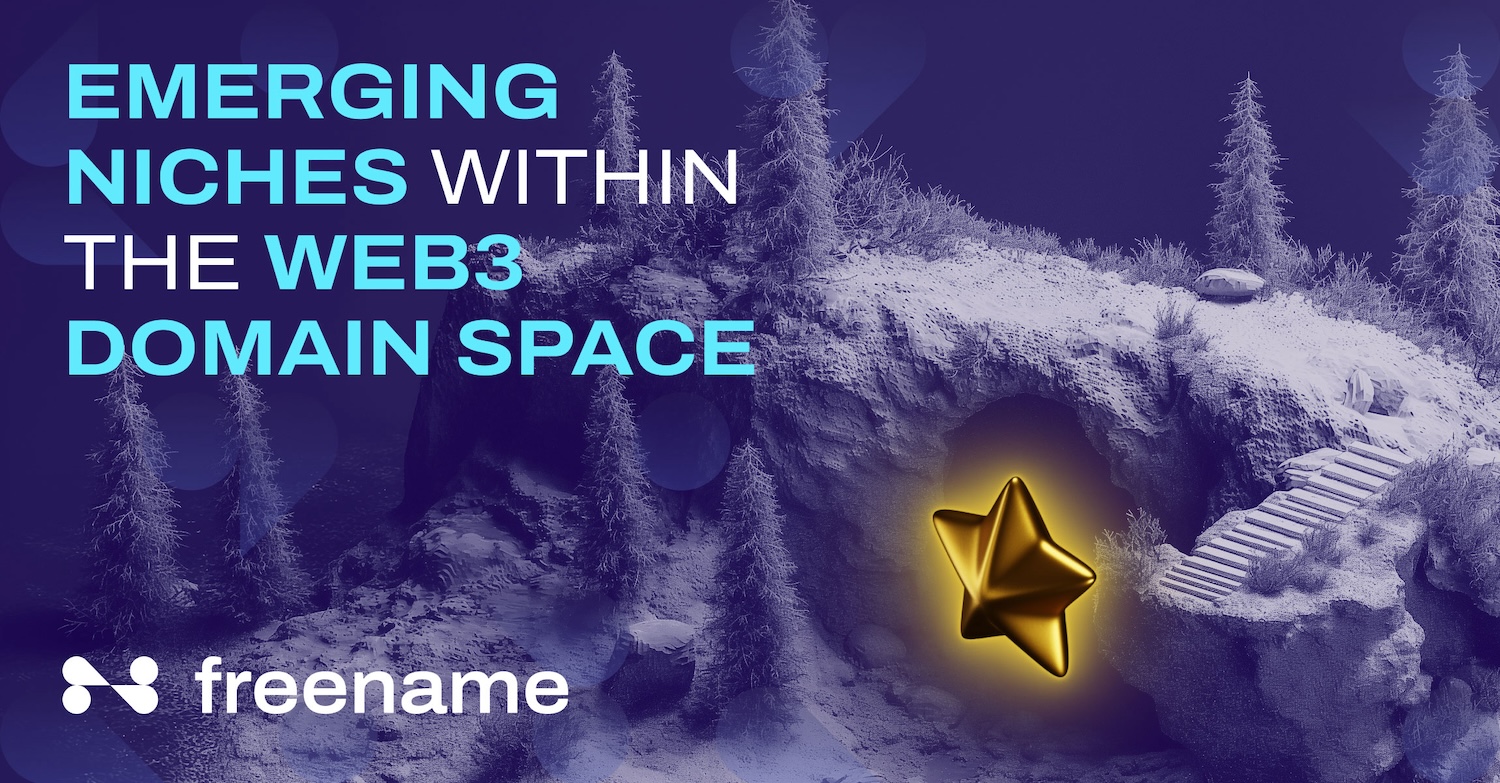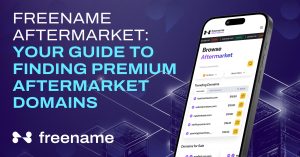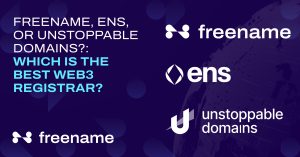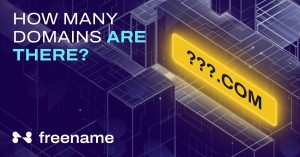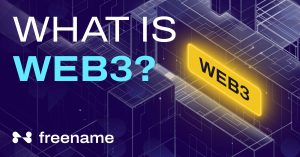Web3 is revolutionizing the internet, putting control back in the hands of users. Each day, new niches are emerging faster than you can say “blockchain.” With unique regulations and promises, Web3 domains and Web3 niches that tap into non-fungible tokens (NFTs) and decentralized finance (DeFi) offer fresh opportunities for growth, community, and innovation.
In this article, we’ll explore the hottest Web3 niches, why they deserve your attention, and how they are transforming the traditional internet experience.
Web3 Domains
Web3 domains are an already growing Web3 niche and they really have significant opportunities. Their offer of decentralized domain name systems (DNS) guarantees a full ownership of those domains and increases security.
With a Web3 domain, you fully own your identity and keep the domain permanently, without needing annual renewals. You can use your Web3 domain for various purposes: building your personal profile, creating your Web3 app, generating recurring revenue, simplifying cryptocurrency transactions by replacing complex wallet addresses with human-readable names, or enhancing your Web2 presence. This allows you to offer something unique to your customers with customized Web3 marketing strategies and advertising.
| With Freename, you can buy a Web3 domain with just one click and start earning money as a reseller. Begin now and be at the forefront of the Web3 revolution! |
Once you own a domain, there are even more opportunities awaiting for you. As an investor, you can “flip” domains and make some money. That is, buy a hot domain at a lower price and sell it for more money when demand goes up. You can also get unique identities for you and your business, which will improve your online visibility and brand recognition.
Web3 domain names also make it possible for new businesses to come to light. We are talking about decentralized app, NFTs and blockchain-based services. And as more people join the Web3 train, the demand for these domains will increase. You would have no trouble making a profit if you were an early adopter and investor.
DeFi (Decentralized Finance)
Decentralized finance (DeFi), where the competition and effort to provide the finest financial services on the blockchain have exploded, is one of the most well-known Web3 niches.
Through decentralized, blockchain-based platforms, DeFi seeks to replicate conventional financial processes, like lending, borrowing, and trading. But in the process, they will also do away with the middlemen (banks).
There are several well-known DeFi protocols. Here are 12 examples:
- PancakeSwap (Binance Smart Chain): It’s popular for BNB-based token trading.
- Aave (Ethereum and Multi-Chain): Lending and borrowing platform with flash loans.
- dYdX (Ethereum Layer 2): Here, you can trade advanced crypto derivatives with high leverage.
- SushiSwap (Multi-Chain): Sushiswap supports multiple chains and is known for liquidity mining
- Curve Finance (Ethereum): This is optimized for stablecoin trading with low slippage .
- 1inch (Multi-Chain): It’s a DEX aggregator that provides the best prices from multiple sources
- Raydium (Solana): This is one of the leading DEXs on Solana and it’s known for fast transactions .
- MakerDAO (Ethereum): It’s a decentralized lending platform that created DAI, a stablecoin.
- QuickSwap (Polygon): It’s a Layer 2 DEX offering low-cost transactions on Polygon network.
NFTs (Non-Fungible Tokens)
You’ve likely heard of non-fungible tokens (NFTs), which have recently ignited a digital revolution in art, collectibles, and more. As a profitable Web3 niche, NFTs are unique digital assets secured by blockchain technology, representing ownership of specific items or content.
We’ve seen celebrities jump on the bandwagon and digital artworks sell for millions of dollars as the NFT boom swiftly reached a fever pitch around 2020. This distinctiveness has produced a very crowded and competitive market, even as it has spurred a creative and financial explosion online.
NFT Platforms
We now have several NFT platforms that draw different groups of artists and collectors. Here are five of the most popular ones:
- OpenSea: It’s the largest NFT marketplace, supporting various assets and multiple blockchains like Ethereum and Polygon .
- Rarible: A community-owned multi-chain platform that supports Ethereum, Tezos, Polygon, and Immutable X and allows users to build and sell NFTs.
- Foundation: Favorite among digital artists because it uses invite-only platform for high-quality art NFTs with auction-based sales.
- Nifty Gateway: It’s a curated platform that’s known for high-profile NFT drops and accepting fiat payments.
- SuperRare: This is a high-end marketplace and you’ll see only unique, single-edition digital artworks here.
Metaverse
If you’ve ever fantasized about being able to instantly teleport from work to the beach, it is now possible with one of the new web3 domain niches, the metaverse! You can hang out with pals, design your ideal home, or even launch a business in this quickly expanding digital world.
It is often described as a 3D version of the internet. It’s where virtual, augmented, and physical realities intersect to create immersive digital environments that make virtual concerts, games, social interactions, and business meetings more engaging than standard online experiences.
And guess what? You don’t have to be that tech-savvy or wealthy to play there, as it is intended for everyone.
There have been a number of important metaverse platforms that have been making the rounds and these include:
- Decentraland: A decentralized virtual world where users can buy, sell, and build on virtual land.
- The Sandbox: A user-generated content platform for gaming experiences, where you as a player can create, own, and monetize your games.
- Roblox: Though it existed before the current metaverse craze, Roblox has added more social and immersive activities that allows you make and distribute your own games.
- Meta: With intentions to build linked virtual areas for socializing, working, and entertainment, Meta is making significant investments in the metaverse. To improve user experiences, it has as its ambitious goal developing cutting-edge VR and AR technology.
- CryptoVoxels: It is a virtual world built on Ethereum, where you can create, sell, and buy virtual assets.
Decentralized Autonomous Organizations (DAOs)
DAO is an organization that operates through smart contracts on a blockchain. These smart contracts are self-executing agreements where the terms are directly written into code. This means that DAOs can function without centralized control or intermediaries. Instead, the community of members makes decisions collectively, frequently through voting mechanisms.
How do DAOs Work?
- Formation: Generally speaking, a DAO is launched by a community or group of individuals who have a same objective. They formulate a set of guidelines that are included in smart contracts and specify the DAO’s functioning.
- Governance: DAOs use community votes in place of a CEO or board in conventional corporations. Typically, each DAO member carries tokens that stand in for their vote power. So you’ll have more influence over decision-making processes when you own more tokens.
- Transparency: Everything within a DAO is transparent and verifiable, as every decision and action is recorded on the blockchain. This reduces the likelihood of corruption and consequently increases member confidence.
- Decentralization: A DAO lacks a central authority. This is deliberate so that collective decisions can be taken to guarantee that no one entity controls the assets and activities of the organization.
Every person can create a DAO and this can become a lucrative Web3 niche to invest now. Creating a DAO involves both technical and community-building efforts, but it provides a powerful way to organize collective decision-making and resource management in a decentralized manner.
Examples of DAOs
- MakerDAO: One of the most well-known DAOs oversees the stablecoin DAI, which is linked to the US dollar. Important choices, including changing interest rates and adding new collateral types, are voted on by the community.
- Aragon: They offer DAO creation and management tools. It enables everyone to launch a decentralized organization or manage a community fund.
- DAOstack: Emphasizing collaboration and governance, this platform provides a foundation for creating DAOs. It seeks to provide scalable, decentralized decision-making solutions.
How to Identify Competitive and Niche Sectors in the Web3 Industry
Exploring the Web3 space is like navigating a vast ocean of possibilities. To discover the most promising markets, you need to identify areas ripe for innovation. Here are some tips to find these niche Web3 domain markets.
Passion and Expertise
Start with what excites you. Do you find yourself drawn to NFTs or is the idea of decentralized finance (DeFi) exciting to you? After that, you have to determine where your talents and interests meet. Are you a community organizer, blockchain developer, or entrepreneurial visionary?
Market Research
Go through the data and examine how many projects are now under development and how much they are worth. Though it can be intimidating, a sector full of projects can also be a sign of a healthy market. Less initiatives, however, could point to a developing niche.
Community News
Register for Web3-related forums, subreddits, and Discord channels. People’s problems and new trends can be learned from these forums. Opportunities are spotted with great benefit from this local knowledge.
Competitive Analysis
Analyze your possible opponents. For what reason are they succeeding? Lacking where? Gaining knowledge of the competition can enable you to create a niche that fills a gap or provides something special.
Innovation Possibilites
Think about how innovative and disruptive each sector can be. Certain places could be ready for a development that would completely change the neighborhood. See what industries, outside of blockchain technology, your project might have a significant influence on.
Above all, you need a Web3 domain to ensure your projects are visible and recognizable within the Web3 community. Explore the available Web3 domains on Freename and purchase yours to kickstart your journey and projects in the Web3 industry.
Conclusion
From decentralized finance (DeFi) to Web3 identity and privacy, each niche within Web3 offers exciting opportunities that will shape the future of the internet. Web3 domains are crucial in this transformation, acting as the gateway to these emerging markets.
The potential for profit in Web3 niches is immense. With the rise of NFTs, decentralized apps, and digital identities, Web3 domains are becoming valuable assets. By securing a Web3 domain, you position yourself at the forefront of this digital revolution, ready to capitalize on the growth and innovation ahead. Embrace Web3 domains and tap into the lucrative opportunities of this rapidly evolving industry.

